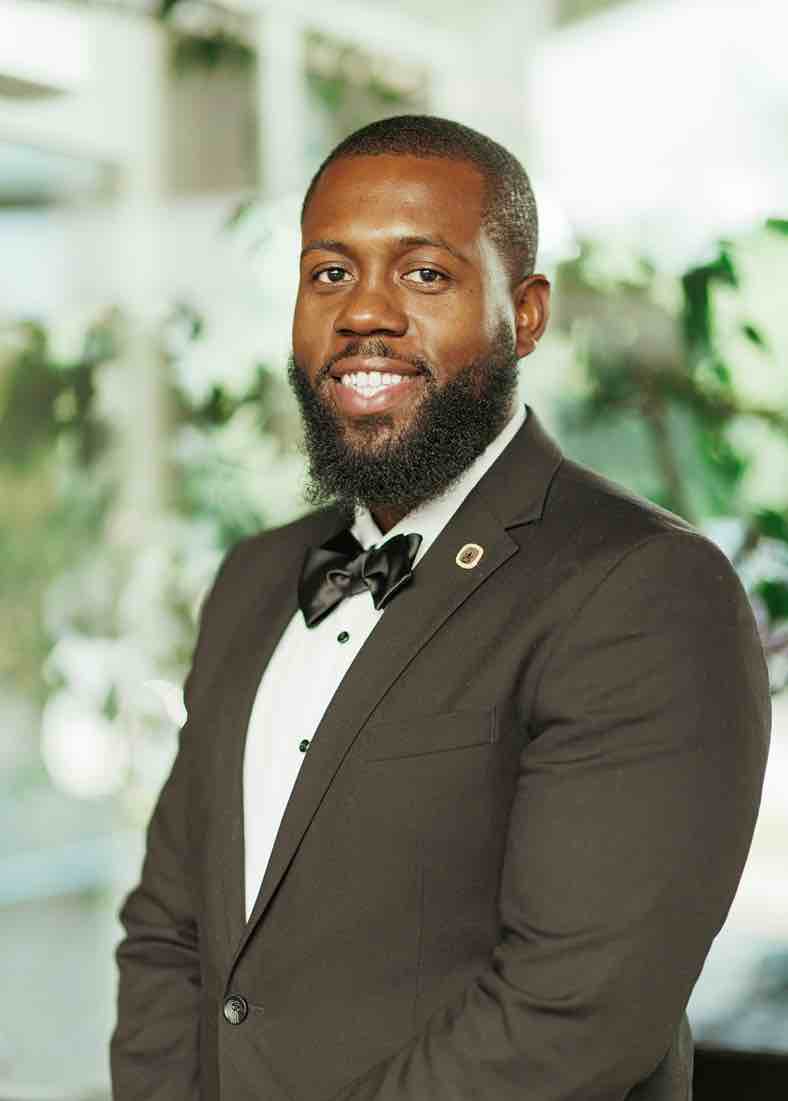George Paasewe, M.S.Ed. '18, Makes A Difference As A Public Speaker, Author
By Tony Scott

Publications..
George Paasewe, M.S.Ed. ’18, cites his parents’ resilience during his childhood, when he and his family fled from war-torn Liberia to the U.S., as inspirational.
“I immigrated to the United States with my family at age five,” he said. “We left our homeland to escape the civil war tearing through Liberia and to chase the American dream. Growing up in a bustling household with five siblings—three boys and three girls—I was deeply influenced by my parents' resilience and hope.”
Paasewe is an adjunct sociology and career development professor at Bryant and Stratton College in Wauwatosa, Wisconsin. He has authored six books; and founded Educare Publications, a publishing company that also teaches authors how to write and self-publish their books.
Additionally, as a public speaker, Paasewe travels around the U.S. speaking to corporations and higher education institutions on the adverse effects of code-switching and its impact on belonging. Code-switching is the switching from the linguistic system of one language or dialect to that of another.
“My discussions focus on identifying its root causes, recognizing burnout symptoms resulting from code-switching out of necessity, and strategies to encourage and support individuals in embracing their authentic selves and alleviating the burden,” he said. “My overarching aim is to eradicate the unconscious exclusion and the marginalization of people of color in these environments.”
Paasewe said he was interested in sociology at a young age and decided to attend NIU for graduate school when he wanted to further his knowledge about the subject.
“From an early age, I was drawn to understanding the societal structures and dynamics that shaped human interactions, which fueled my ambition to become a sociology professor,” he said. “This passion led me to Northern Illinois University, where I aimed to deepen my knowledge and contribute to the field through academic study and research.”
He added, “I chose Northern Illinois University for its distinguished Adult and Higher Education program, which offered a unique perspective on student development essential for my goal of becoming an innovative sociology professor. NIU’s commitment to research and teaching excellence, combined with a supportive academic community, perfectly aligned with my aspirations to deeply understand and contribute to the evolving field of sociology.”
While a student at NIU, Paasewe received assistance that paid for his tuition, which helped him complete his graduate degree without financial hardship.
“I was fortunate to attend NIU with a tuition waiver scholarship through the Ronald E. McNair Scholars Program, designed to prepare undergraduate students from underrepresented and low-income backgrounds for doctoral studies through involvement in research and scholarly activities,” he said.
Paasewe served as graduate hall director of the Fanny Ruth Patterson Complex, then known as New Hall, as a graduate assistantship through Housing and Residential Services, which gave him valuable leadership and administrative experience. He also was involved in a variety of other roles on campus.
“The role of graduate hall director allowed me to interact with diverse students closely and profoundly immerse myself in campus life,” he said. “I was actively involved in the Student Government Association, serving as a senator throughout my two-year tenure at NIU. Additionally, I was a Committee on Diversity and Inclusion member, explicitly focusing on Campus Climate. These roles significantly enhanced my leadership skills and provided valuable insights into student affairs, significantly contributing to my academic and professional development in sociology.”
Paasewe was involved in a focus group study on the Huskie Food Pantry, as the community assessment intern for the Student Involvement and Leadership Office.
“We explored various topics, from the effectiveness of the pantry's lottery system, which randomly assigns shopping times to ensure fairness, to the types of services offered and their scheduling. The discussions also covered participants' satisfaction with the customer service and the overall impact of the pantry on their academic performance and financial well-being,” he said. “The findings highlighted a desire for more frequent operations and a broader selection of food items to meet students' diverse needs better. Overall, the internship provided invaluable experience in community assessment and student services, aligning perfectly with my Adult and Higher Education studies at NIU.”
A strong mentor who guided his time at NIU was Dr. Vernese Edghill-Walden, the university’s former vice president for Diversity, Equity and Inclusion and chief diversity officer.
“With a shared background as immigrants—Dr. Edghill-Walden from Barbados and myself from Liberia— and having pursued bachelor of arts degrees in sociology, our connection was both immediate and profound,” he said. “Dr. Edghill-Walden's guidance was instrumental in shaping my professional aspirations to become a chief diversity officer for a Fortune 500 company. She provided me with invaluable insights into the nuances of the role. She invited me to become a committed member of the Committee on Diversity and Inclusion, focusing specifically on Campus Climate. This experience profoundly molded me into the DEI practitioner I am today, offering hands-on experience addressing and influencing diversity dynamics within a university setting.”
He continued, “Our discussions often revolved around the critical skills needed to excel in DEI, such as empathy, resilience, and the ability to drive meaningful change. Her mentorship offered a clear pathway to achieving my professional goals and effectively deepened my understanding of advocating for equity and inclusion in a corporate setting. Dr. Edghill- Walden's impact on my career aspirations has been profound, setting a foundation of knowledge and confidence that I continue to build upon.”
Paasewe said the most challenging aspect of his jobs is addressing the deeply ingrained issue of code-switching and its impact on individuals in both corporate and educational environments.
“This challenge lies in dismantling long-standing institutional practices that encourage code-switching, thus perpetuating a cycle of exclusion and marginalization of people of color,” he said. “Identifying and changing these behaviors requires persistent effort and strategic insights, which can be mentally and emotionally taxing.”
However, he said it is rewarding to see the transformative impact on individuals who embrace their authentic selves after engaging with his discussions and writings.
“As they shed the burdens of code-switching, these individuals often experience a profound sense of belonging and empowerment,” he said. “Additionally, the success of Educare Publications in empowering people to tell their stories through writing and self-publishing provides immense satisfaction, further driving home the impact of my efforts across different facets of my career.”
To Paasewe, a true NIU Huskie embodies a combination of resilience, community spirit and intellectual curiosity.
“These qualities define what it means to be a Huskie and prepare students for successful careers and meaningful lives post-graduation,” he said. “They embody the spirit of Northern Illinois University students and alumni in all their endeavors.”
